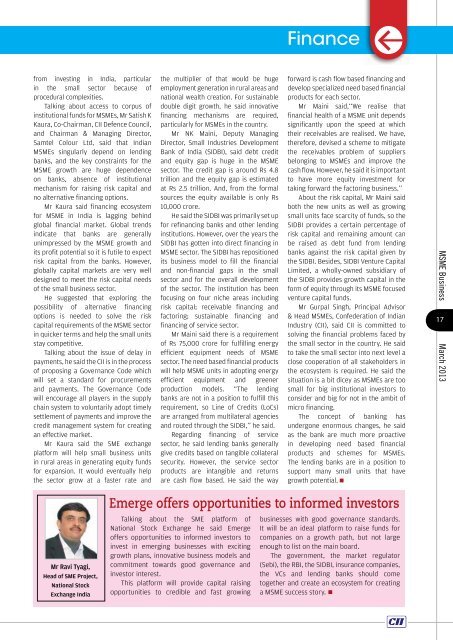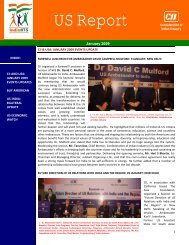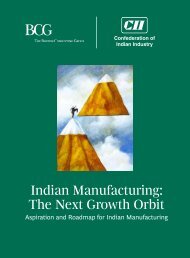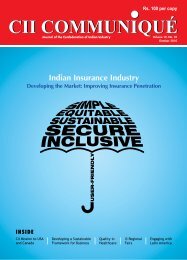Journal of Small Business and Enterprise - March, 2013 - CII
Journal of Small Business and Enterprise - March, 2013 - CII
Journal of Small Business and Enterprise - March, 2013 - CII
You also want an ePaper? Increase the reach of your titles
YUMPU automatically turns print PDFs into web optimized ePapers that Google loves.
Financefrom investing in India, particularin the small sector because <strong>of</strong>procedural complexities.Talking about access to corpus <strong>of</strong>institutional funds for MSMEs, Mr Satish KKaura, Co-Chairman, <strong>CII</strong> Defence Council,<strong>and</strong> Chairman & Managing Director,Samtel Colour Ltd, said that IndianMSMEs singularly depend on lendingbanks, <strong>and</strong> the key constraints for theMSME growth are huge dependenceon banks, absence <strong>of</strong> institutionalmechanism for raising risk capital <strong>and</strong>no alternative financing options.Mr Kaura said financing ecosystemfor MSME in India is lagging behindglobal financial market. Global trendsindicate that banks are generallyunimpressed by the MSME growth <strong>and</strong>its pr<strong>of</strong>it potential so it is futile to expectrisk capital from the banks. However,globally capital markets are very welldesigned to meet the risk capital needs<strong>of</strong> the small business sector.He suggested that exploring thepossibility <strong>of</strong> alternative financingoptions is needed to solve the riskcapital requirements <strong>of</strong> the MSME sectorin quicker terms <strong>and</strong> help the small unitsstay competitive.Talking about the issue <strong>of</strong> delay inpayments, he said the <strong>CII</strong> is in the process<strong>of</strong> proposing a Governance Code whichwill set a st<strong>and</strong>ard for procurements<strong>and</strong> payments. The Governance Codewill encourage all players in the supplychain system to voluntarily adopt timelysettlement <strong>of</strong> payments <strong>and</strong> improve thecredit management system for creatingan effective market.Mr Kaura said the SME exchangeplatform will help small business unitsin rural areas in generating equity fundsfor expansion. It would eventually helpthe sector grow at a faster rate <strong>and</strong>the multiplier <strong>of</strong> that would be hugeemployment generation in rural areas <strong>and</strong>national wealth creation. For sustainabledouble digit growth, he said innovativefinancing mechanisms are required,particularly for MSMEs in the country.Mr NK Maini, Deputy ManagingDirector, <strong>Small</strong> Industries DevelopmentBank <strong>of</strong> India (SIDBI), said debt credit<strong>and</strong> equity gap is huge in the MSMEsector. The credit gap is around Rs 4.8trillion <strong>and</strong> the equity gap is estimatedat Rs 2.5 trillion. And, from the formalsources the equity available is only Rs10,000 crore.He said the SIDBI was primarily set upfor refinancing banks <strong>and</strong> other lendinginstitutions. However, over the years theSIDBI has gotten into direct financing inMSME sector. The SIDBI has repositionedits business model to fill the financial<strong>and</strong> non-financial gaps in the smallsector <strong>and</strong> for the overall development<strong>of</strong> the sector. The institution has beenfocusing on four niche areas includingrisk capital; receivable financing <strong>and</strong>factoring; sustainable financing <strong>and</strong>financing <strong>of</strong> service sector.Mr Maini said there is a requirement<strong>of</strong> Rs 75,000 crore for fulfilling energyefficient equipment needs <strong>of</strong> MSMEsector. The need based financial productswill help MSME units in adopting energyefficient equipment <strong>and</strong> greenerproduction models. ``The lendingbanks are not in a position to fulfill thisrequirement, so Line <strong>of</strong> Credits (LoCs)are arranged from multilateral agencies<strong>and</strong> routed through the SIDBI,'' he said.Regarding financing <strong>of</strong> servicesector, he said lending banks generallygive credits based on tangible collateralsecurity. However, the service sectorproducts are intangible <strong>and</strong> returnsare cash flow based. He said the wayforward is cash flow based financing <strong>and</strong>develop specialized need based financialproducts for each sector.Mr Maini said,``We realise thatfinancial health <strong>of</strong> a MSME unit dependssignificantly upon the speed at whichtheir receivables are realised. We have,therefore, devised a scheme to mitigatethe receivables problem <strong>of</strong> suppliersbelonging to MSMEs <strong>and</strong> improve thecash flow. However, he said it is importantto have more equity investment fortaking forward the factoring business.''About the risk capital, Mr Maini saidboth the new units as well as growingsmall units face scarcity <strong>of</strong> funds, so theSIDBI provides a certain percentage <strong>of</strong>risk capital <strong>and</strong> remaining amount canbe raised as debt fund from lendingbanks against the risk capital given bythe SIDBI. Besides, SIDBI Venture CapitalLimited, a wholly-owned subsidiary <strong>of</strong>the SIDBI provides growth capital in theform <strong>of</strong> equity through its MSME focusedventure capital funds.Mr Gurpal Singh, Principal Advisor& Head MSMEs, Confederation <strong>of</strong> IndianIndustry (<strong>CII</strong>), said <strong>CII</strong> is committed tosolving the financial problems faced bythe small sector in the country. He saidto take the small sector into next level aclose cooperation <strong>of</strong> all stakeholders inthe ecosystem is required. He said thesituation is a bit dicey as MSMEs are toosmall for big institutional investors toconsider <strong>and</strong> big for not in the ambit <strong>of</strong>micro financing.The concept <strong>of</strong> banking hasundergone enormous changes, he saidas the bank are much more proactivein developing need based financialproducts <strong>and</strong> schemes for MSMEs.The lending banks are in a position tosupport many small units that havegrowth potential.MSME <strong>Business</strong> <strong>March</strong> <strong>2013</strong>17Emerge <strong>of</strong>fers opportunities to informed investorsMr Ravi Tyagi,Head <strong>of</strong> SME Project,National StockExchange IndiaTalking about the SME platform <strong>of</strong>National Stock Exchange he said Emerge<strong>of</strong>fers opportunities to informed investors toinvest in emerging businesses with excitinggrowth plans, innovative business models <strong>and</strong>commitment towards good governance <strong>and</strong>investor interest.This platform will provide capital raisingopportunities to credible <strong>and</strong> fast growingbusinesses with good governance st<strong>and</strong>ards.It will be an ideal platform to raise funds forcompanies on a growth path, but not largeenough to list on the main board.The government, the market regulator(Sebi), the RBI, the SIDBI, insurance companies,the VCs <strong>and</strong> lending banks should cometogether <strong>and</strong> create an ecosystem for creatinga MSME success story.
















